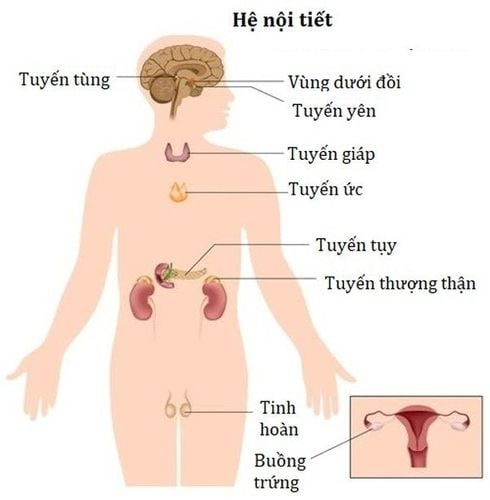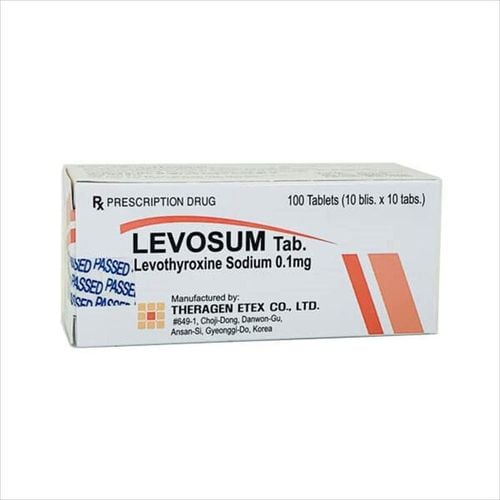This is an automatically translated article.
The article was professionally consulted with Master, Doctor Do Xuan Chien - Head of Department of Medical Examination & Internal Medicine - Vinmec Ha Long International General Hospital.The endocrine system is a system of endocrine glands, which produce and release hormones that help control many important bodily functions, including the ability to convert calories into energy. to cells and organs in the body. The endocrine system affects heart rhythm, tissue and bone growth, fertility, and more. As a vital system, any disorder of the endocrine system can affect it. to humans, even threatening death.
1. Glands in the endocrine system
Each gland of the endocrine system releases specific hormones into the bloodstream. These hormones travel through the bloodstream to cells and help control or coordinate body processes.Endocrine glands include:
Adrenal glands: Two glands located at the upper poles of the kidneys, which release the hormone cortisol. Hypothalamus: A part of the lower midbrain that controls the activity of the pituitary gland. Ovaries: Female reproductive organs, which release eggs and produce sex hormones. Pancreatic islet cells: Cells of the pancreas that control the release of the hormones insulin and glucagon. Parathyroid glands: Four small glands in the neck that play a role in bone growth. Pineal gland: A gland located near the center of the brain that may be involved in sleep processes. Pituitary gland: A gland located at the base of the brain, often referred to as the “command gland” because it affects many other glands, especially the thyroid gland. Problems with the pituitary gland affect bone growth, a woman's menstrual cycle, and the secretion of breast milk. Testicles: The gonads in men that produce sperm and sex hormones. Thymus: A gland in the anterior chest region that helps the body develop the immune system during the first years of life. Thyroid: A butterfly-shaped gland in the anterior neck region that controls metabolism.

2. Causes of endocrine disorders
Hormonal disorders are often divided into two groups:
Endocrine diseases are the result when an endocrine gland secretes too much or too little hormone, called an endocrine imbalance. Endocrine diseases are caused by the growth of lesions (such as nodules or tumors) in the endocrine system, which may or may not affect hormone levels. The endocrine system's counterregulatory mechanism helps to control the hormonal balance in the blood. If the levels of a certain hormone are too high or too low, the backregulatory system signals the endocrine glands to re-regulate. Hormonal imbalance can occur if the backregulatory system is no longer able to keep the balance of the hormone levels in the blood, or when the body is unable to remove the required amount of hormone from the body. .
An increase or a decrease in hormone levels can be caused by:
Bad backregulatory system Pathology One endocrine gland is no longer able to regulate another endocrine gland in hormone secretion ( eg, a problem with the hypothalamus that can't command the pituitary) Genetic disorders, such as multiple endocrine neoplasia (MEN) or congenital hypothyroidism (CH) Infections Endocrine gland tumors Most endocrine neoplasms are non-malignant, they usually do not spread to other parts of the body. However, the nodule or tumor can interfere with the gland's hormone production.
3. Types of Endocrine Disorders
There are many different types of endocrine disorders, with diabetes being the most common. Other endocrine disorders include:
Adrenal insufficiency: The adrenal glands release too little of the hormone cortisol and sometimes aldosterone. Symptoms include fatigue, abdominal discomfort, dehydration, and changes in the skin. Addison's disease is a type of adrenal insufficiency. Cushing's disease: The pituitary gland is over-secreted causing the adrenal glands to become overactive. There is also a similar condition, but called Cushing's syndrome, which can occur at any age, but is more common in children, as a result of high doses of corticosteroid drugs. Acromegaly and growth hormone disorders: If the pituitary gland secretes too much growth hormone, the bones and organs in children will grow abnormally fast, and vice versa, if it secretes too much growth hormone. the child will stop growing in height. Hyperthyroidism: Thyroid gland produces too much hormone, leading to weight loss, fast heart rate, night sweats, restlessness. The most common cause of hyperthyroidism is an autoimmune disorder called Grave's disease. Hypothyroidism: The thyroid gland does not produce enough hormones, leading to fatigue, constipation, dry skin, and depression. Hypothyroidism can be congenital, and cause developmental delays in children. Hypopituitarism: The pituitary gland secretes little or no hormone. There are many causes for this situation. Women with hypopituitarism may experience amenorrhea. Multiple endocrine neoplasia I and II (MEN I, MEN II): These are rare genetic disorders that result in overproduction of many hormones. Polycystic ovary syndrome: too much androgen will affect the development of the egg and the release of the egg. Polycystic ovary syndrome is one of the leading causes of infertility. Precocious Puberty: Precocious puberty occurs when the endocrine glands secrete sex hormones too early than normal.
4. What to do when there is an endocrine disorder?
When there are signs and symptoms of an endocrine disorder, see a specialist. The doctor will explore the symptoms of the disease, history, and assign appropriate tests to serve the diagnosis. If sick, appropriate treatment will be proposed, but the process of treatment and monitoring needs patience, because sometimes they are quite complicated and need to be adjusted regularly to suit the specific situation. .
Endocrine disorders need to be detected and treated early. Vinmec International General Hospital offers customers a package of basic gynecological examination and screening to help women proactively check their physiological health, screen for disease risk and have scientific treatment.
Please dial HOTLINE for more information or register for an appointment HERE. Download MyVinmec app to make appointments faster and to manage your bookings easily.
Articles refer to the source: webmd.com














